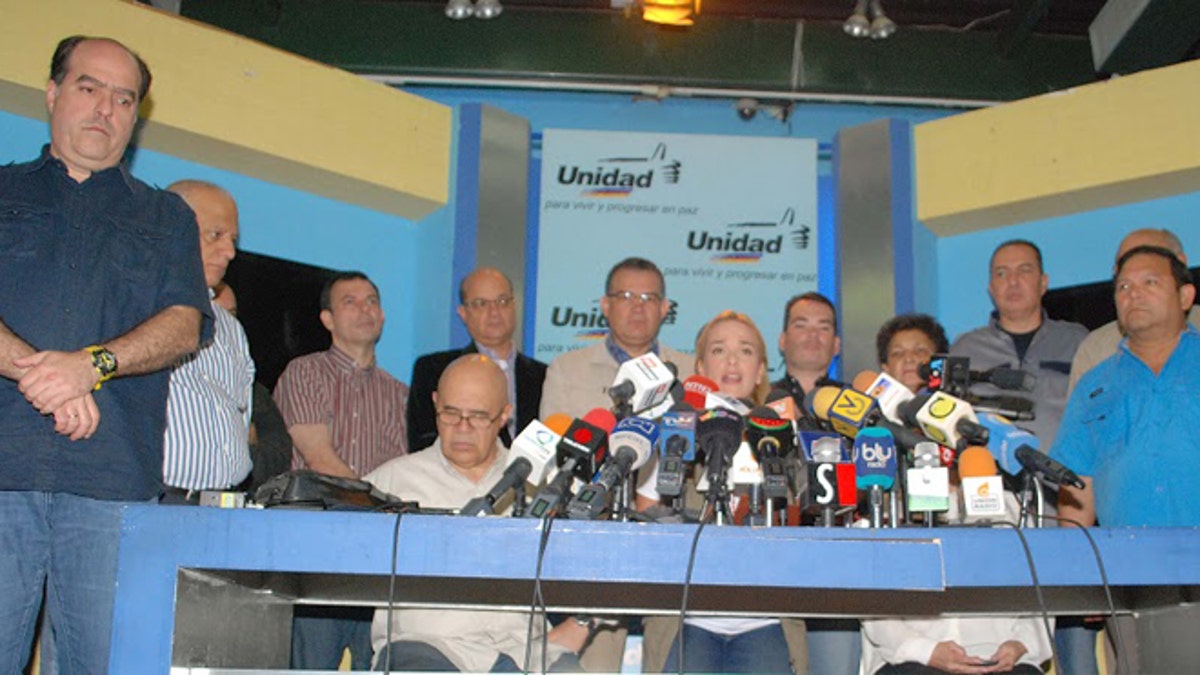
The Democratic Unity Roundtable held a news conference on Wednesday in which members of more than 20 political parties participated. (Photo: Antonio Rodriguez/courtesy of Voluntad Popular) (ANTONIO RODRIGUEZ)
On Saturday, thousands of Venezuelans across the country took to the streets to demand the release of political prisoners and the setting of a firm date for legislative elections later this year.
In an indirect way, the crowds also forced the hand of the Democratic Unity Roundtable, or MUD, the coalition of 29 parties fielding a joint slate of candidates to oppose the ruling socialist PSUV.
MUD had been split on the protest – which was called by the leader of Voluntad Popular (“Popular Will”), Leopoldo López, from his jail cell – with many opposition parties preferring to focus on winning the parliamentary elections rather than mounting demonstrations.
But on Wednesday MUD’s secretary general, Jesús Torrealba, led a press conference in which representatives of the more than 20 parties participated.
He announced a schedule of protests that starts Thursday which join in the demands made at the Saturday demonstrations and the 17 activists and politicians who have gone on hunger strike since last week.
“It avoids a political catastrophe,” Felix Seijas, local political analyst and pollster, said to Fox News Latino. “Unity is the best asset the opposition has.”
Seijas, the director of the Venezuelan polling firm Delphos, continued, “Polls show that independents and former Chavistas who are unhappy with the political situation don’t like political in-fighting and want unity and cohesion. They were used to [late President Hugo] Chávez’s leadership.”
MUD’s planned activities start with Thursday demonstrations outside of the Venezuela’s Electoral Council building in each state. On Saturday, there’s a vigil in churches across different states, and on Sunday the few opposition candidates who have been selected for the legislative elections will hold "house-to-house" meetings in their districts.
And on Tuesday congressmen from different parts of Venezuela will protest the removal earlier this year of a Voluntad Popular mayor, Lumay Barreto, from Guasdualito in the state of Apure, by the town’s municipal council, which is controlled by the PSUV.
The council claimed that she was derelict in her duties, and Venezuela’s Supreme Court, which is heavily influenced by President Nicólas Maduro’s regime, ruled on Monday that the council’s decision was legal.
Altogether four opposition mayors have been removed from their posts since the December 2013 election.
The others are Daniel Ceballos, former mayor of San Cristóbal, Tachira, who is now on hunger strike in jail; Enzo Scarano, former mayor of San Diego, Carabobo, who has been imprisoned for more than a year; and Antonio Ledezma, the mayor of Caracas who is under house arrest.
But opposition unity isn’t complete. MUD still has to determine three-quarters of its candidates for the legislative elections. (Twenty-five percent were already chosen in a May 17 primary.)
Initially, the names – which are supposed to be selected by consensus – were to be revealed before the primary, but internal conflicts delayed the announcement, and now some parties want more spots because they got more votes in the primary.
Scarano, of the Cuentas Claras (“Clean Slate”) party, assured FNL that MUD will have no difficulty getting together about this issue.
“We have time – the date [of the election] hasn’t even been set yet,” he said. “Everyone will respect the agreements.”
But analysts aren’t so sure.
“Candidates have to be in the streets campaigning as soon as possible,” said Seijas.
He says that polls show that, politically, the country is now less divided than it used to be.
“Just around 20 percent of the people believe radically in the government or in the opposition right now,” Seijas said.
“If the Roundtable just focuses on issues like political prisoners or censorship, it will be speaking to its base, just around 10 percent of the population,” he added. “That’s why they have to speak about the elections, and in order to do that you need to have your candidates ready. If you don’t, street protests will not be as successful.”




